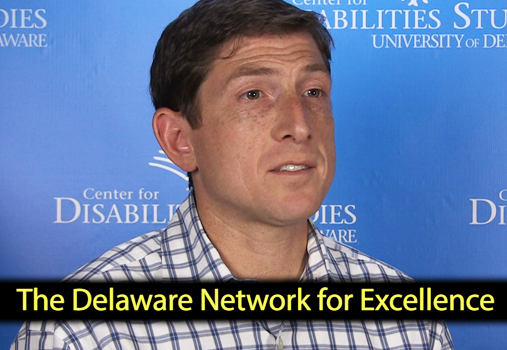Altering the autism landscape
By Brian Freedman

Training and technical services that will be available to specialists who support people with autism get Brian Freedman’s enthusiastic backing in this CDS video.
The numbers are concerning. The percentage of children with autism in Delaware schools has more than tripled over the past 12 years and services have failed to keep up. Families report waiting more than a year to receive an accurate diagnosis after they first notice symptoms. And 62 percent of children under five had to see at least three different clinicians before autism was identified.
Why is it still so hard for people with autism and their families to receive proper services, when society’s awareness about autism supposedly has grown? Delaware physicians, clinicians, teachers and other providers just have not had enough training to know how to best support these individuals and families in a meaningful and coordinated fashion. As a result, families have to become experts on their child’s care and the coordinator for their treatment team. Yet, families also report that providers often downplay their perspective, ultimately leaving many to feel dismissed, stressed and alone.
I expect that’s about to change, thanks to other, encouraging numbers. This summer, three projects totaling nearly $4 million were awarded that will begin to alter the landscape for how services are conducted in Delaware. Each project builds upon a years-long effort that included a statewide assessment conducted by the Center for Disabilities Studies (CDS), as well as collaboration among family members, professionals and community partners, which resulted in a comprehensive strategic plan for autism services, called the Blueprint for Collective Action.
First this summer, the University of Delaware, in partnership with Nemours/A.I. DuPont Hospital for Children, was awarded a federal grant to create a Leadership Education in Neurodevelopmental Disabilities (LEND) program. This program will largely focus on training graduate students and postdoctoral residents from a variety of fields to deliver individualized, high quality care that respects a person’s perspective and culture, as well as coordinate treatment with other professionals. Trainees will learn through classes, clinic observations and direct experiences with professionals, and from people with disabilities and family members. The aim is to continuously infuse new experts into the Delaware system and cultivate leadership skills among the next generation of professionals. You can learn more about the LEND program from this CDS video.
State lawmakers also passed legislation that created the Delaware Network for Excellence in Autism (DNEA), which will be based at the University of Delaware and include a partnership with Autism Delaware. This training and technical assistance center will support agencies and organizations, such as early intervention specialists and providers who support adults with autism, as well as assist families in navigating the healthcare landscape. The training offered by the network will include on-site coaching in order to help organizations build internal expertise. You can learn more about the DNEA from this CDS video.
Another federal grant, awarded this month, will aid Delaware physicians in conducting more timely autism screening, establish a model of care coordination, and improve access to evaluation and early intervention. This multi-faceted project includes partnerships between experts from the University of Delaware, Autism Delaware, Nemours, Delaware Family Voices, the Delaware Department of Education and the Delaware Department of Public Health, who will work with family members of children with autism to develop clearer and more efficient family-centered processes for receiving care. Services for those who historically had less access to quality health care options, such as families in Sussex County, will be particularly targeted for improvement.
This next phase of elevating services for children and adults with autism and their families is exciting. However, these funding streams are not permanent, nor are the initiatives comprehensive. But if the dedication and resolve of our partners is any indication, we are primed to make a strong impact and have growing success in the future.
Categories: autism, Center for Disability Studies, developmental disabilities, employment, people with disabilities, training, Uncategorized, University of Delaware
Tags: Autism Delaware, Blueprint for Collective Action, CDS video, Delaware Department of Education, Delaware Department of Public Health, Delaware Family Voices, Delaware Network for Excellence in Autism (DNEA), Delaware schools, Leadership Education in Neurodevelopmental Disabilities (LEND), Nemours/A.I. DuPont Hospital for Children.

